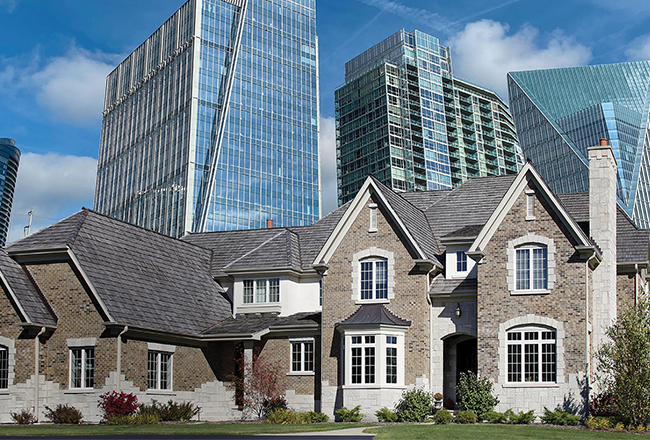NO SALE: Fairfield County real estate brokers say ‘mansion tax’ would kill business
Connecticut state Sen. Martin Looney”™s proposal to add a statewide tax on residential and commercial properties is not sitting well with area real estate brokers. Instead, they say, it would have a deadening effect on the progress that both Fairfield County and Connecticut in general have seen over the past couple of years, particularly during the Covid era.
“People have increasingly been coming here from Westchester County and New York City ”” and a big reason is that the taxes here are lower,” Roxanna Bajra, a Realtor with Berkshire Hathaway in Stamford, told the Business Journal. “To turn around and say, ”˜Oh, by the way, we”™re going to tax you more”™ ”” what”™s the allure to come into Connecticut?”
 Looney (D-Hartford), who is the Senate president pro tempore, unveiled his proposal last month. It would require those who own a house whose market value is at least $430,000 to pay one extra “mill” ”” $1 for every $1,000 of assessed value ”” in property taxes each year.
Looney (D-Hartford), who is the Senate president pro tempore, unveiled his proposal last month. It would require those who own a house whose market value is at least $430,000 to pay one extra “mill” ”” $1 for every $1,000 of assessed value ”” in property taxes each year.
The senator and some fellow Democrats believe the move would raise $73.5 million a year, which would be redistributed to cities and towns that are struggling financially.
“You have a disparity in Connecticut where Hartford has a mill rate of 74, Greenwich a mill rate of 11,” Looney told WVIT. “Greenwich raises over $30 million on a single mill. Other communities raise very modest amounts of probably $100,000 or so on a mill.
“In a state this small, to have these kinds of contrasts is a real economic drag and anchor on our state,” he said.
Given that it is designed to raise the most money from Connecticut”™s most affluent communities, it comes as no surprise that Fairfield County municipalities would bear the brunt of the proposal. According to legislative estimates, Greenwich property owners would pay the most under the proposal ”” nearly $21.8 million ”” followed by Westport ($6.6 million), Stamford ($5.8 million), and Darien ($5.2 million).
Looney has floated a so-called “mansion tax” before, most recently in 2019 when it failed to gain traction. But that proposal was aimed at property sales of more than $2.5 million. While Realtors were opposed to it as well, they said that at least it came closer to being applied to actual mansions.
“$430,000 is not a mansion,” Ryan Raveis, co-president of Shelton-based William Raveis, told the Business Journal. In addition, he said, “These things always grow over time, like our income tax has. It gets to the point where, in the long term, you start to drive people out of the state. As it is, some of the uber-wealthy and giant companies have already left” over the past few years.
Due in large part to the Covid effect, where an unusually high number of people and companies have relocated from New York City and Westchester to Connecticut, Raveis said that Fairfield County unit sales were up in December 2020 by 59% compared with the previous December, with the median sales price of $606,000 representing a 34.7% increase.
Greenwich was particularly strong ”” unit sales were up 145.9%, and the median sales price rose by 9.6% to $2 million for the period ”” while unit sales also dramatically increased in Westport (129%), New Canaan (135%), Weston (93%) and others.
Jayme Stevenson, the Republican first selectwoman of Darien ”” which saw a 68.4% increase in unit sales ”” told a Feb. 1 Zoom conference hosted by the Connecticut Conference of Municipalities that “The health of our state is dependent on many factors ”” one of those is the health of our urban centers.”
However, she added, “I oppose new taxes. I most definitely oppose a statewide mansion tax.”
Senate Republican Leader Kevin Kelly (R-Stratford) has also disparaged Looney”™s proposal.
“Connecticut Democrats”™ solutions ”” tolls, gas taxes and insurance taxes ”” always target middle-class families”™ wallets,” he said. “Now they are coming after the middle-class family home.”
“Unequivocally, the Connecticut Realtors (association, or CTR) strongly opposes any new tax on real estate,” the organization”™s president-elect, Tammy Felenstein, told the Business Journal. “We”™re finally seeing some growth and this would be a huge roadblock to our continuing to grow.”
Felenstein, who is also executive vice president, managing director of sales at Brown Harris Stevens in Stamford, said that for all that momentum, house and condo sales are still not up to the level they were before the 2008-09 recession.
“People who own a $430,000 home are probably struggling to get by,” she said.
“One of the arguments we make when people are considering Fairfield County over Westchester County is that our taxes are so much lower,” Felenstein said. “Yes, you have to travel a little farther to get to and from Manhattan, but it”™s worth it, with our quality of life, our schools and other factors.”
A $1 million home in Scarsdale will come with $23,000 to $31,000 in property taxes, while a similarly priced home in Greenwich has property taxes of about $7,300 to $9,500, according to SITL Home Renovation & Design in Greenwich.
Raveis said that New York is hardly the only point of contention for the Fairfield County market.
“We”™re also competing with Rhode Island and Massachusetts,” he said. “We have to have strong value for people to keep coming here, instead of somewhere else. The last thing we want to do is undermine ourselves.”
“Why discourage people from coming here?” asked Bajra. “We want to keep people in Connecticut, not chase them out.
“We as Realtors have fought these kinds of statewide taxes before,” she said, “and we will do it again this year.”
